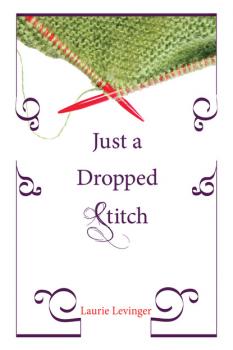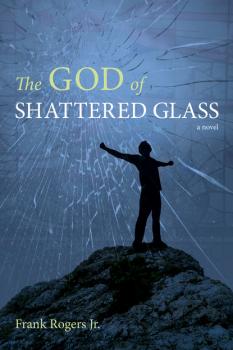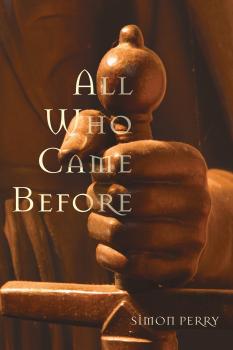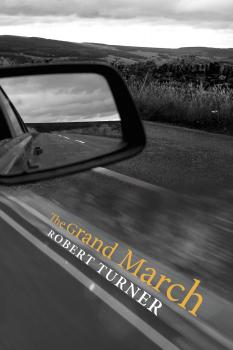ТОП просматриваемых книг сайта:
Emerald City Books
Скачать книги из серии Emerald City BooksАннотация
Just a Dropped Stitch is a memoir told in interlocking short stories. It's a family photo album; each snapshot tells a mini-story. You're sure you understand what you're seeing, but it's not until you've finished flipping through the entire album that you develop an intimate sense of who this family is. You thought you knew them, understood all the subtleties and dynamics, but, change the angle, soften the focus, flip the page; there's a different story.
Jesse, the narrator, is on a search. She's trying to identify the «dropped stitches» in her own life, to name them, and reknit them into a whole.
As the book opens Jesse's mother is dying, but Jesse and her father find it impossible to face the inevitable. Turn the page: Jesse desperately wants to have children; she's a lesbian; she has to figure out how to make that happen. Later we meet her children, Noah and Sophie; we're introduced to Anna, who becomes Jesse's spouse, before the world has caught up with the concept. We meet grandparents, and learn that in Jesse's family writing is revered, but infused with unspoken taboos. And we meet her brothers who each has a particular place to stand in the family portrait.
Jesse has a story to tell, and she isn't sure it's safe to tell it. Loss and grief, being silenced and silencing oneself, becoming frozen, and the heat-generating, melting power of love, these are the themes in Just a Dropped Stitch. The importance of naming, the redemption that comes from breaking silences, these are the interwoven threads.
Meanwhile, keep flipping through the album and you see snapshots of everyday life: hiking with Noah, shopping with Sophie for a bat mitzvah dress. And Jesse's mother, who refuses to completely disappear, makes a surprise appearance, embarrassing Jesse at a job interview. As we close the album, we're keeping vigil with Jesse in the hospital while she waits to hear whether she has the disease that killed her mother. And, then, there's a final snapshot: a handmade Chinese box, with sides that drop open, revealing a blood-red interior where there's nothing to hide.
Jesse, the narrator, is on a search. She's trying to identify the «dropped stitches» in her own life, to name them, and reknit them into a whole.
As the book opens Jesse's mother is dying, but Jesse and her father find it impossible to face the inevitable. Turn the page: Jesse desperately wants to have children; she's a lesbian; she has to figure out how to make that happen. Later we meet her children, Noah and Sophie; we're introduced to Anna, who becomes Jesse's spouse, before the world has caught up with the concept. We meet grandparents, and learn that in Jesse's family writing is revered, but infused with unspoken taboos. And we meet her brothers who each has a particular place to stand in the family portrait.
Jesse has a story to tell, and she isn't sure it's safe to tell it. Loss and grief, being silenced and silencing oneself, becoming frozen, and the heat-generating, melting power of love, these are the themes in Just a Dropped Stitch. The importance of naming, the redemption that comes from breaking silences, these are the interwoven threads.
Meanwhile, keep flipping through the album and you see snapshots of everyday life: hiking with Noah, shopping with Sophie for a bat mitzvah dress. And Jesse's mother, who refuses to completely disappear, makes a surprise appearance, embarrassing Jesse at a job interview. As we close the album, we're keeping vigil with Jesse in the hospital while she waits to hear whether she has the disease that killed her mother. And, then, there's a final snapshot: a handmade Chinese box, with sides that drop open, revealing a blood-red interior where there's nothing to hide.
Информация о книге
Автор произведения Laurie E. Levinger
Жанр Контркультура
Серия Emerald City Books
Аннотация
Where does one find hope in the midst of profound suffering? Tony Backman aches to know. A blues-harmonica-playing child psychologist at a residential treatment center in Santa Rosa, California, Tony specializes in narrative therapy. His story-based technique empowers abused teenagers to reimagine their lives through myths and folktales and so restore their vitality. Such vitality, however, eludes Tony in his own life. Mired in depression, he longs for his fractured family and fends off childhood flashbacks too painful to face. Tony's mentor recommends classical underworld myths as a roadmap for the spiritual journey toward healing and hope, but Tony is too drained for the undertaking. Until Carey Foster enters his life. Carey is a golden-voiced eleven-year-old choral soloist at a local Catholic boys' home. Brought to Tony's treatment center with his wrists sliced, Carey cowers mutely with his secrets in the center's locked ward, a flicking middle finger his only beacon. Carey's healing depends on Tony's ability to navigate the labyrinth of deception and cryptic self-disclosure that conceals the soul's darkest secrets. It also depends upon Tony's willingness to navigate the labyrinth of love and disappointment lodged in his own soul. At once a psychological study of how trauma is healed; a hero's journey through the underworld of abuse, betrayal, and shattered faith; and a theological thriller in search of a credible and sustaining Sacred in the midst of unspeakable suffering, The God of Shattered Glass reveals that stories do indeed heal, and that the way to God is not up, but down.
Аннотация
For too long the story of history's most infamous terrorist, Yeshua Bar-Abbas, has been mistold. The only way to get justice from the Roman Empire is to steal it. By travelling to the Judean capital and avenging his brothers, Yeshua has achieved precisely that. However, the newfound friends who unexpectedly came to his aid have now blocked his way home to Egypt. An alcoholic archer, an over-zealous rabbi, a nervous shepherd boy, and an overweight farmer have further plans for Yeshua and his brother, Theudas. Each of them will discover that the kind of justice you win depends on how you fight for it. Violent revenge, passive resistance, or reluctant acts of terror? Each will bear its own fruit.
Аннотация
The human experience is an intimate, tough, and, at times, hilarious conversation with what is familiar and what is mystery. Poetry at its best turns this conversation into art and teaches by example how to employ language creatively and courageously–even coyly–in exploring the full range of human response to whatever life may deliver. Certainly the biblical Psalms set the highest of standards in this regard. In Opening King David, Davis takes aim at making contemporary poems in conversation with the Psalms; his personal, cultural, and natural surroundings; and the wonder and mess of his own soul. As a painter with all colors at his disposal, Davis writes with the full spectrum of his available vocabulary, sometimes reaching for the glorious ineffable, at other times bluntly telling it like it–darkly–is. Neither devotional nor inspirational nor religious, these human poems take God seriously and honor our common struggle toward what Saint Paul calls «the measure of the stature of the fullness of Christ.»
Аннотация
When young Russell Pinske feels life is passing him by, he hits the road to shake things up. He catches a ride as far as his hometown in Indiana to visit friends and find a way to the West Coast. While there he stumbles through the summer on his wayward journey of self-discovery, bouncing from one impetuous impulse to another, becoming involved in the misbegotten capers of a gang of petty crooks and falling into a romance with an older woman. His motivation for his trip begins to wane as he gets mired in small-town life and wrapped up in the problems and preoccupations of the people around him. So when an old friend cruises into town under mysterious circumstances and offers a ride to California, Russell sees a chance to get back on the road and back on track, if he can extricate himself from his entanglements.





